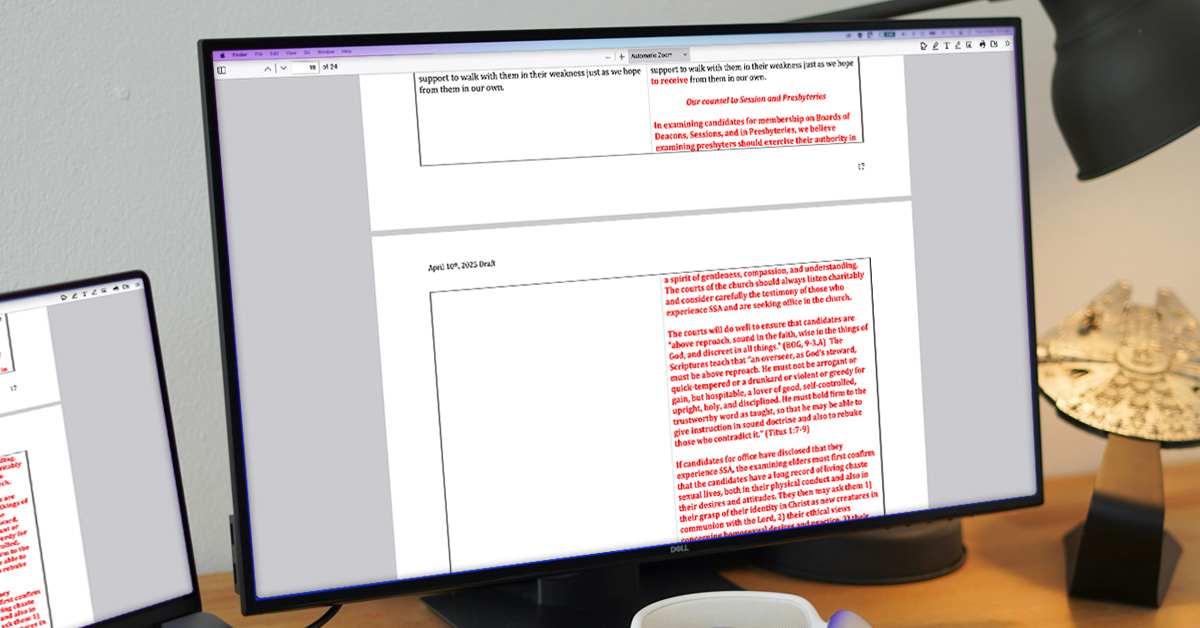By Peter Larson
TE, Midwest Presbytery
When God speaks, he doesn’t mumble. His Word is clear. His commands are not vague, ambivalent, or impossible to understand. As Jesus said, “Let what you say be simply ‘Yes’ or ‘No’; anything more than this comes from evil.” (Matthew 5:27).
Satan, on the other hand, loves ambiguity. The serpent, we’re told, was the most subtle of all the animals in the garden. The serpent took the clear command of God and twisted it beyond recognition: “Did God really say you should not eat from any tree in the garden? Well, if God said that, surely, he didn’t mean it!” Satan loves subtlety and nuance because it gives him room to maneuver and work mischief.
Currently, the EPC is seeking clarity. The question is whether a person who is celibate but identifies as homosexual and experiences ongoing homosexual desire should be ordained to ministry. This question caused four years of turmoil in the PCA and now it has come to us.
Unfortunately, the draft report written by the Ad Interim Committee on Same Sex Attraction provides no clear answer to this question. Instead of clarity, the report is cloudy. Instead of a clear standard for ordination, there is only pastoral guidance that carries no binding or constitutional authority. As written, the report provides plenty of wiggle room for presbyteries to ordain someone like Greg Johnson, who is the center and source of this controversy.
The General Assembly will not vote on the Ad Interim Committee’s report until next year. However, during a question-and-answer session at this year’s Assembly, commissioners voiced serious concern about the draft report and its recommendations. Comments and questions focused on four main issues.
Terminology
Although it discourages use of “gay Christian,” the draft report says this term could be a “useful, descriptive term in some settings.” Voicing concern, one commissioner said, “We don’t identify ourselves by our sin but by our identity in Christ.”
Bryan Rhodes, a TE from Gulf South Presbytery, questioned the use of “same sex attraction” to describe homosexual desire. Rhodes urged the AIC to substitute the term “unnatural desire” in keeping with the Bible and the Westminster Standards. “If persistent, unnatural temptation is not disqualifying, the question is why not?” asked Rhodes.
David Milroy, a TE from Presbytery of the Alleghenies, asked why the draft report avoided the language found in Question 139 of the Westminster Confession, which uses the terms “sodomy” and “unnatural lust.” Another commissioner expressed concern that the draft report says little about repentance.
No Clear Standard
The draft report includes a list of seven questions to be used by congregations and presbyteries when interviewing candidates who have disclosed that they experience same sex attraction. Candidates who demonstrate “godly responses to these and other questions … may be considered for church office.” The problem, however, is that there is no clear definition of what constitutes a godly response. As a result, approval of candidates becomes subjective and determined by each presbytery. This will inevitably lead to each presbytery having its own criteria for ordaining SSA candidates, or what is known as “local option.”
Not Enforceable
In the EPC, a pastoral letter has no authority or enforcement power but only offers general guidance. As noted above, the draft report only provides similar, non-binding pastoral advice.
“My concern is that (the draft report) is little more than a suggestion,” said TE Thomas Nelson from Midwest Presbytery. Nelson urged the AIC to resolve the issue in a way that presbyteries will share a common approach and standard of ordination.
The draft report also recommends that candidates be considered for ordination only if they have a “long record of living chase sexual lives, both in their physical conduct and also in their desires and attitudes.” The problem, however, is that it is impossible to verify a candidate’s physical chastity, much less their desires and attitudes.
Our Christian Identity
Another commissioner voiced concern that the draft report does not go far enough in stating that homosexual identity should be “subordinated” to our identity in Christ. He urged instead that the wording be changed from “subordinated” to “rejected.” A commissioner from Oregon said the term “gay Christian” would create confusion about the fundamental nature of our identity and would be “unhelpful and hurtful” in his ministry context.
Members of the AIC emphasized that the report is still a work in progress and encouraged churches to provide feedback. Responding to a question, committee member Shelley Kral said that the AIC believes it is “unhelpful and unbiblical to call yourself a gay Christian,” but they didn’t want to “police language” or “stifle conversations” between candidates and churches.
When you look back on the liberal drift of the mainline denominations, there is a common thread: conservative Christians have been too trusting, too conciliatory, too naïve, and too willing to compromise. Many of us witnessed this in the PC(USA). Committees on sexuality were heavily stacked with liberals, and conservatives always comprised a minority. What often happened is that conservatives were co-opted and persuaded to compromise. The gradual erosion of biblical standards was justified in the name of peace and unity. It was a wrecking ball strategy, and it worked. In the end, liberals gained control and many conservatives departed the denomination.
Agreeing to disagree is helpful in some situations. However, it does not work when it comes to core biblical standards of sexuality. It is wrong to seek a third way where none exists. In the words of Ed Stetzer:
Placing sexuality in the adiaphora category is theologically problematic, biblically inaccurate and historically naïve. For all the ways Christians have disagreed, they have been unanimous for two thousand yeas about same-sex sexual behavior. Evangelicals have joined the historic Christian witness, rejecting the position that marriage and sexuality are adiaphora. Instead, we believe that marriage and sexuality are central to the biblical witness and the gospel itself. And the gospel is essential for unity.1
If we compromise on the issue of same sex attraction and identifying with one’s sinful tendencies, it will not promote peace or unity. Rather, it will lead to churches leaving the EPC (some have left already). When biblical standards become ambiguous, it leads to the ruin and wreckage we have witnessed in the PC(USA) and other mainline denominations. Verbal ambiguity on this issue is not loving or charitable: it is the road to discord and division.
Clarity is charity. If the EPC is going to hold together, we need a clear, unequivocal standard of ordination on this issue. Yes, there is a place in the church for people who identify as homosexual and experience homosexual desire; they deserve our love and compassion. However, that place is not leadership. Those ordained to church office must be an example to the flock, above reproach, and living a Godly life — not struggling with unnatural desires. If a candidate for ordination was struggling with sexual desire for his mother, sister, or little children, we would not ordain such a person — period.
Instead of equivocating, the church needs to clearly say “no” to ordaining those who identify as homosexual, whether celibate or not. The unity of the EPC is not based on our ethos or willingness to compromise; it is based on faithfulness to Christ and obedience to His Word. In the coming months, we must pray for the AIC that God will guide and give them clarity. If the report remains ambiguous, then we must pray for a minority report that provides clarity.
The Church of Jesus Christ, in all the centuries before the ethical collapse of mainline Protestant denominations, never knowingly allowed individuals with unnatural sexual desires to hold church office. If we are to maintain historic orthodoxy on the issue of homosexuality, we must be clear that only heterosexuals meet biblical standards for church offices.
____________________
1 Stetzer, Ed. “Can Faithful Christians Agree to Disagree on Sexuality?” Church Leaders, June 18, 2025.


Leave a Comment